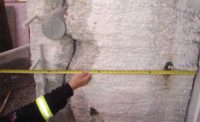Under a settlement agreement reached on Jan. 20, the state of Florida will cease to oppose Progress Energy's plans to proceed with roughly $1 billion in repair work at its damaged Crystal River Nuclear Unit 3 in return for millions of dollars in refunds to customers and restrictions on funding for a proposed $20-billion nuclear plant.
The settlement must be approved by the Florida Public Service Commission (PSC). Progress would refund customers $288 million to replace fuel at the out-of-commission plant, receive a $150-million general rate increase and be limited on cost recovery for a new nuclear plant proposed for Levy County, Fla.
The company says it needs more engineering work completed on various repair options and clearer cost estimates before it decides whether to repair or retire Crystal River's damaged unit. Engineering work is 25% to 30% complete on a fix to the cracked containment building wall, said Progress CEO Bill Johnson during a conference call on Jan. 23. A Progress spokesman says vendors vying for the repair job are completing engineering work. The utility previously estimated repairs to the containment building wall at between $900 million and $1.3 billion.
State public counsel J.R. Kelly, who represents ratepayers, says the parties are "encouraging [Progress] toward repairing Crystal River [Nuclear Unit] 3, obviously if it is done in a safe, prudent and cost-effective manner. Everybody on our side of the table would like to see the plant up and running."
To encourage the company to begin work this year, the parties have waived their right to challenge Progress' decision to go forward on repairs.
The 914-MW nuclear unit has been idle since 2009, when the utility self-managed a job to replace a steam generator inside the unit's 42-in.-thick concrete containment dome. During the work, the concrete began to delaminate, or separate. Kelly and others questioned Progress' decision to self-manage the job and fought any attempt by Progress to charge its customers for all the repair costs and for replacement fuel—an amount that could top $2.5 billion.
Under the settlement, Progress would seek recovery of the costs to repair the damage from its insurer, the Nuclear Electric Insurance Ltd. (NEIL). While NEIL has delayed payments, Johnson says the delays have been caused by the complex nature of the claim.
If the costs exceed NEIL's payment, Progress would try to reach a settlement with the Office of Public Counsel and other parties in the repair case in front of the PSC. If a settlement cannot be reached, the parties would petition the PSC to decide how to split the costs not covered by NEIL. If repairs exceed the approved repair estimate, Progress would split the cost evenly with ratepayers of those repairs, up to $400 million.
"It's prudent. That way both sides have skin in the game," says Kelly. "It will keep Progress mindful of any cost overruns." The settlement also would allow Progress to exit its engineering, procurement and construction contract for a new nuclear plant in Levy County, Fla. But Progress hasn't made any decision about the EPC contract with Shaw and Westinghouse, says Suzanne Grant, a Progress spokeswoman. Gentry Brann, a spokeswoman for Shaw says Shaw has not done any significant work since 2009 on the Levy project, estimated at $20 billion.
The settlement also caps to $3.40 a month ratepayer fees for advance work on the planned AP1000 nuclear unit.




